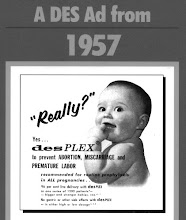
“....a general publicity campaign for DES-exposed people to identify themselves would create community anxiety without tangible benefit.” [Correspondence 12/10/99 by former Minister for Health and Aged Care, Dr Michael Wooldridge]
“The advice provided by the Department in 2005 that it is not appropriate for information on DES to be included in breast and cervical screening program correspondence to participants, as it could create unnecessary anxieties for women who may not know if they have been exposed to DES, is still current.” [Correspondence 16/2/09 by Senator the Hon Jan McLucas – Parliamentary Secretary to the Minister for Health and Ageing]
COMMENT
DES exposure is a serious public health issue affecting a considerable number of Australian people (approx 68,000-156,000 DES mothers, daughters and sons). The above stance by government beggars belief, especially where if similar statements were said of other issues, for example, asbestosis, lead-based paint, tobacco or even tainted food products, there would be public outcry. In Australian public health information, DES takes a very poor background position where one has to magically know about DES in the first instance to search the DES topic. The government frequently vaguely states that DES exposed women should be encouraged to see their doctor for specific management and surveillance, but there is no effective encouragement forthcoming. The DES issue for women who may not know if they have been exposed to DES has been effectively managed in USA with the Interactive DES Self-Assessment Guide (http://www.cdc.gov/des/consumers/guide/index.html ).
It is stated in the NSW Cancer Council Diethylstilboestrol (DES) and Cancer Position Statement (www.cancercouncil.com.au/editorial.asp?pageid=248) that many people remain unaware of their exposure and the potential adverse health effects of DES. There is inherent failure by government to recognise this vital point. As recently as last weekend, in an extremely short space of time at the Breast Cancer Network’s forum in Sydney, through the representation of DES Action NSW, 3 DES mothers learnt for the first time about the effects of DES and the possible association of their breast cancer diagnosis to DES. They had no prior knowledge of the special need of DES mothers to have annual mammography. In the organisation’s experience, instances as this are too frequent and beg the question “How many more people are unaware?” The DES tragedy becomes a double whammy where DES exposed people and their families have been deprived of accessible information for their vital reproductive and cancer preventive health care – a doubling of the tragedy that is largely preventable with responsible government action. Indeed, anxiety can be created by not telling.
The unfairness and injustice of having been DES exposed pales into insignificance compared to the unfairness and injustice in needing to challenge authorities for responsible action. When confronting Australian government on the DES issue, it always bears considering that the Therapeutic Goods Administration is 100% funded in fees by the pharmaceutical industry. Here lies the ongoing challenge for the organisation DES Action NSW.


